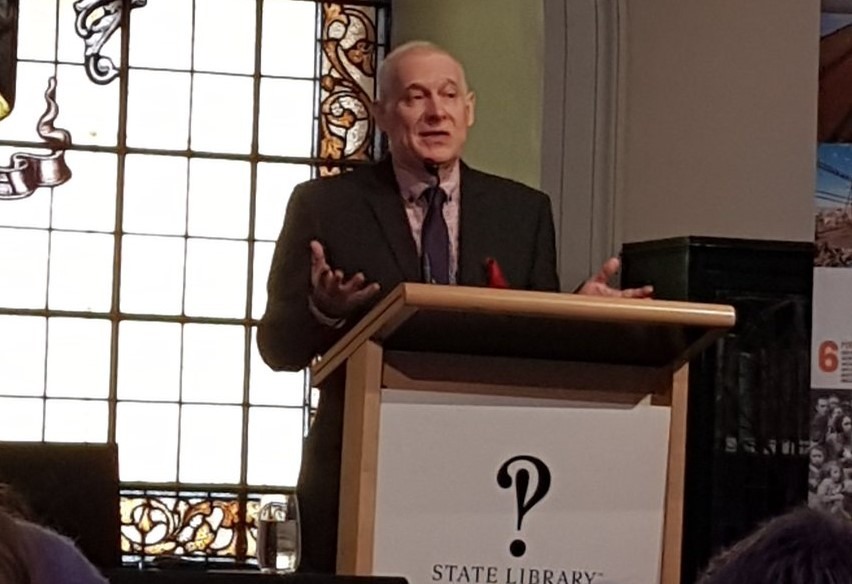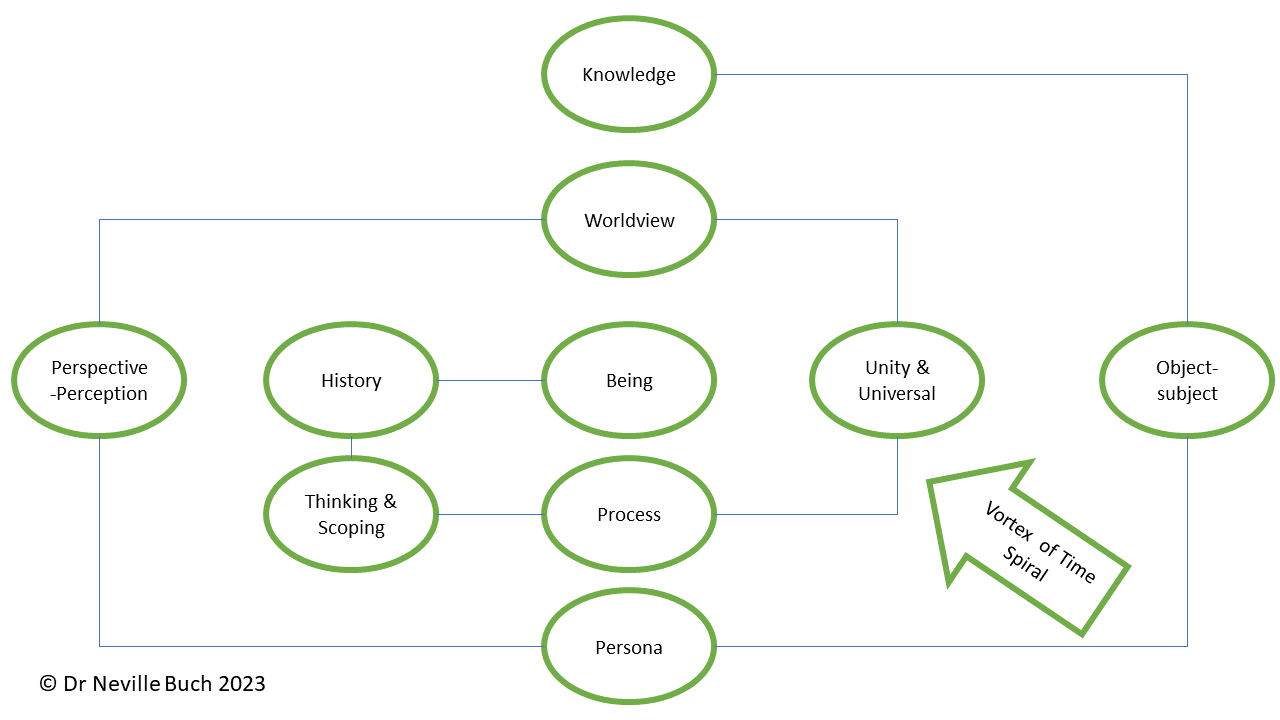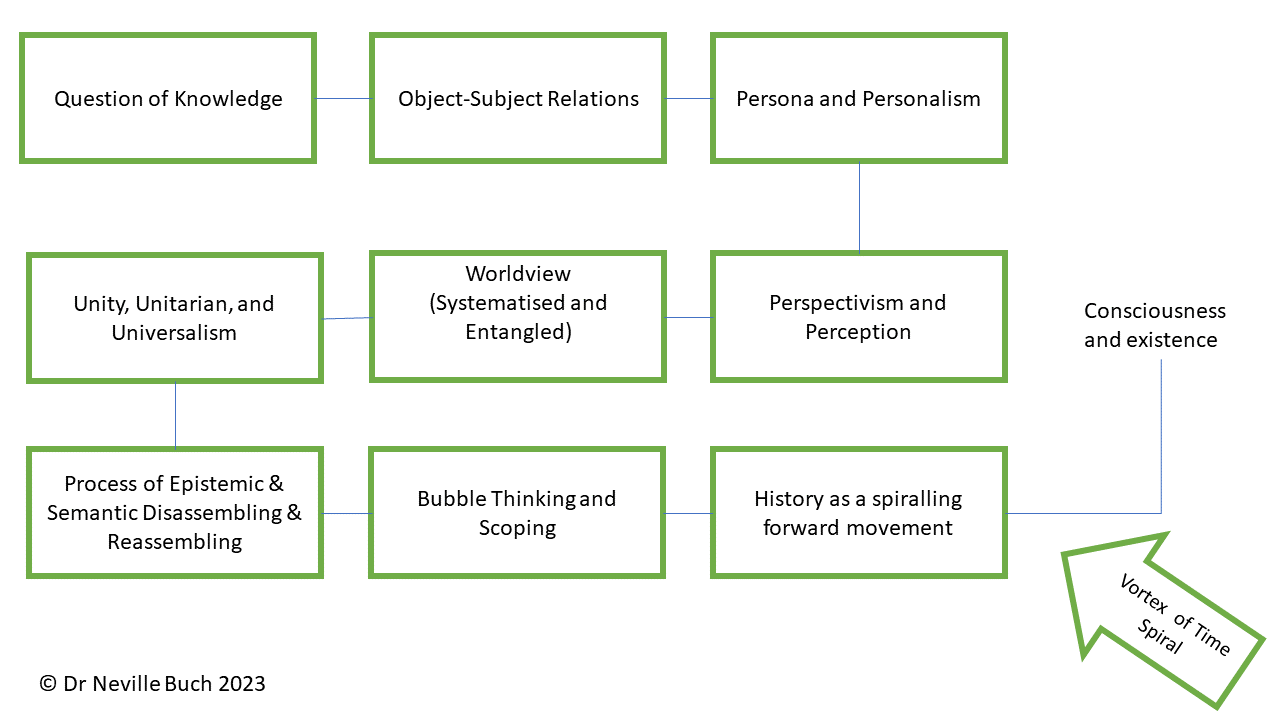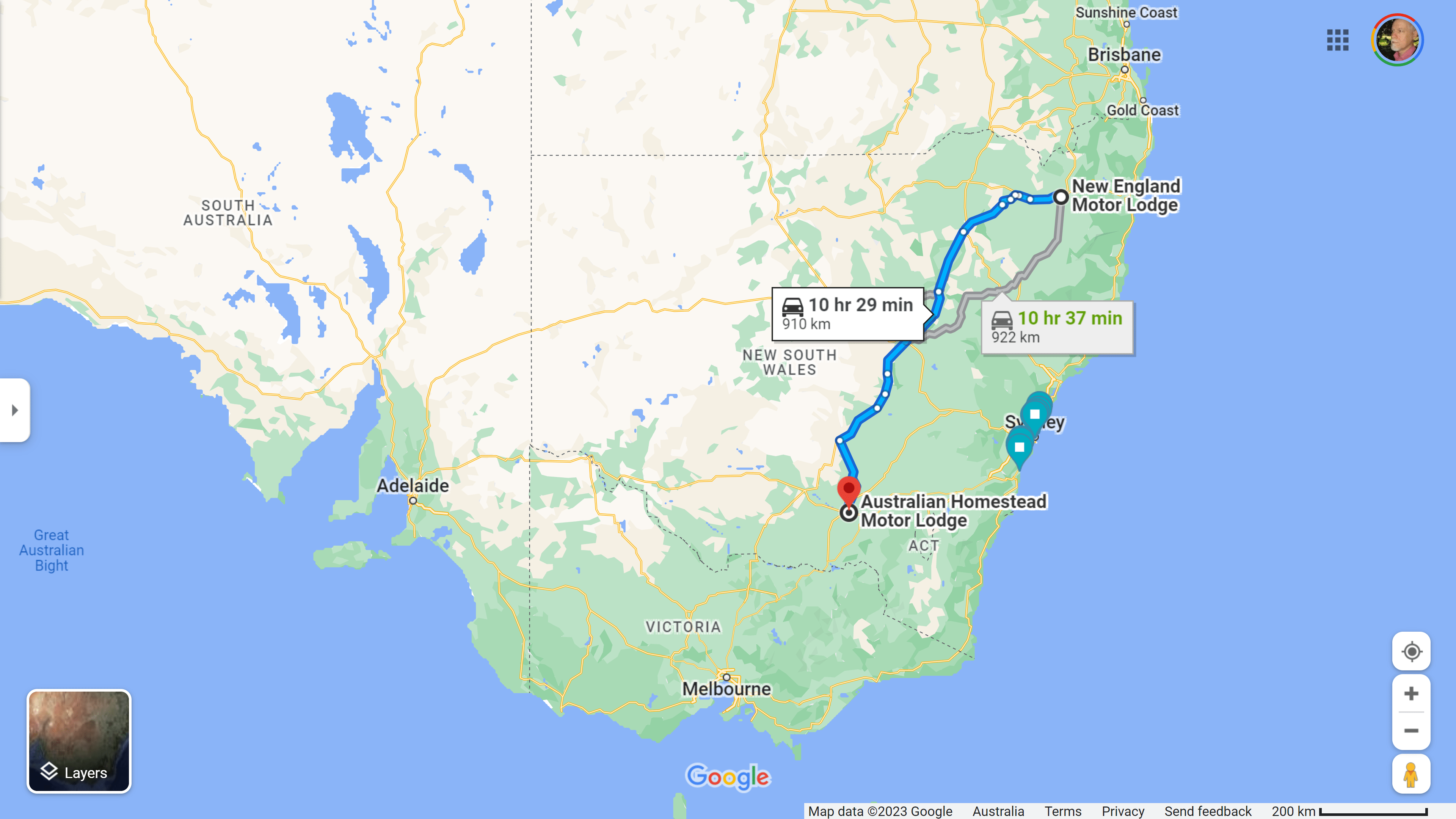Dr Neville Buch’s Philosophy and History Article: Downloadable PDF Version

2018-08-30 Neville at the 2018 PHA Conference, ASKING THE QUESTIONS AND PROVIDING THE FRAMEWORKS
In the early morning, before dawn broke, I dreamed of how to explain my philosophy and history (historiography).
It came as my mind recovered from the slightly-over twelve-hour drive from Glen Innes to Gumly Gumly, just outside of Wagga Wagga; no, for the non-Australians, I am not talking in tongues. These are real named places. The physically distance is a little under 1,000 kilometres (621.3 miles). These are two objects with a subject in-between. Furthermore, the places are physically real. The names are conceptually real. The language is inter-subjective, lived in an object world of communication. This morning (10 April 2023), after the stress on body, mind, and perhaps soul (the vague spiritual connection between body and thought, between the material physics and abstract thought), I can close my eyes and I see the long road before me, in motion. This is the imagination of the real world, but it is not normatively how we experience reality. I lived a day on the road drive, and now I imagine it, or recall it. The recall of memory is, however, entangled. It is imagined, and thought to be re-imagined from the past experience, which is now conceptualised as personal history. It is not imagined in the way that the process was originally experienced. Already, in a matter of a short number of hours, there has been a process of disassembling and reassembling in the brain (material) / mind (abstraction). On these journeys, I use a dash camera. When I download the video segments to the PC, the images are very different to when I close my eyes and those ‘mind images’ rush in, as consciousness.
In what was explained in the above paragraph are a number of steps in philosophy and history. It is not necessary to follow those steps in the exact order of my overview below, however, there is sense to my mind in how they flow, from asking the question of the knowledge to that existential sense of being – a self-awareness, which we call consciousness.
Knowledge is always personal, or else you’re fooling yourself, and you do not know. It is also objective, in that knowledge requires ‘reflection’ which is beyond the alleged demonstration of ‘knowledge’ in imitation or disposition.
Question of Knowledge
As Socratics shows, the conversation begins in the question of knowledge. Epistemology has had a long historical journey. A few hard-headed postmodernist thinkers believe that the journey has come to an end; replaced by imagination or fragmented stories. They are in their own world of fantasy here. The more you listen to them and their reasoning, the more you realise that their explanations are the very small bubble thinking of egoism. The bulk of the population gets-on in a very connected world of the object-subject, and of the real and imaginary – inclusively!
Object-Subject Relations
An object is a philosophical term often used in contrast to the term subject. A subject is an observer and an object is a thing observed. The contested matters are the relation between the two. Descartes argued that we can cut out all knowledge of objects through a process of skepticism, but it’s impossible to doubt the subject of our self (the thinking self for Descartes). There are philosophers who will argue that the relationship is not as Descartes describes in his thought experiment, nevertheless, it is a hard cynic who would argue that no relationship exists. In which case the hard cynic – doubting totally all meaning in the terms – would find it impossible to communicate an argument when there is no common semantics; we are back to the bubble thinking of egoism.
Persona and Personalism
There is a persona here for the locked-in egoist, as it is for the rest of the population. A persona, depending on the context, is the public image of one’s personality, the social role that one adopts, or simply a fictional character. Historically it relates to the idea of a theatrical mask – it is a construction of mind in presenting self to the world. Twentieth century philosophy had developed this framework as central to understanding phenomena, and it is called, psychology. Personalism, on the other hand, is an intellectual stance that emphasizes the importance of human persons. Personalism exists in many different versions, and is diversely defined across philosophical and theological movements. There is a great historical intersection here between the psychology, education, and historiography, through philosophers, such as F. C. S. Schiller, Wilhelm Dilthey, George Howison, and Max Scheler.
Perspectivism and Perception
In thinking who I am as a person, it a small step to understanding perspective and perception. Perspectivism is the epistemological principle that perception of and knowledge of something are always bound to the interpretive perspectives of those observing it. While perspectivism does not regard all perspectives and interpretations as being of equal truth or value, it holds that no one has access to an absolute view of the world cut off from perspective. Instead, all such viewing occurs from some point of view which in turn affects how things are perceived. Rather than attempt to determine truth by correspondence to things outside any perspective, perspectivism thus generally seeks to determine truth by comparing and evaluating perspectives among themselves. The list of philosophers who developed such an outlook is extensive, but importantly, Protagoras, Michel de Montaigne, Gottfried Leibniz, and, of course, Friedrich Nietzsche.
Worldview (Systematised and Entangled)
What is sustained in these thoughts is Weltanschauung, the fundamental cognitive orientation of an individual or society encompassing the whole of the individual’s or society’s knowledge, culture, and point of view. The term was first used by Immanuel Kant and later popularized by Hegel. Wilhelm Dilthey published an essay entitled “The Types of Worldview (Weltanschauung) and their Development in Metaphysics” that became quite influential. The typologies of worldview are always contested, but this matters little, in that typologies are only models with the pretence of stability. A model is being presented in this blog article. There are no final words which correctly describes how worldviews work. Furthermore, outside of the models, in how the mind actually works in its projection, worldviews are entangled with different schemas and fragments of ideas (or ideals).
Unity, Unitarian, and Universalism
The question then becomes how do mind-matters fit together if ideas are entangled. These are questions of unity, unitarianism, and universalism. Unifying is bringing things together, but not merely as an assemblage. The assemblage has to have fit. The assemblage must hold sustainably together – at least for some time. (western) Religion follows these schools of thought. Unity, known informally as Unity Church, is an organization founded by Charles and Myrtle Fillmore in 1889. It grew out of Transcendentalism and became part of the New Thought movement. ‘Unitarian’ is different. To be unitarian is to be for a singularity, a ‘one’. Unitarianism (1565–present) is the liberal Christian theological movement known for its belief in the unitary nature of God, and for its rejection of the doctrines of the Trinity, original sin, predestination, and of biblical inerrancy. University is different again. To be universal is to scope outwards to total inclusion. Universalism is the philosophical and theological concept that some ideas have universal application or applicability. The Christian universalism movement in the United States originally referred to the idea that every human will eventually receive salvation in a religious or spiritual sense, a concept also referred to as universal reconciliation. That idea generated into religious universalism, that all religion has largely a common groundwork of thinking. Unitarian Universalism (often referring to themselves as ‘UUs’ or ‘Unitarians’) is originally a North American liberal pluralistic religious movement that grew out of Unitarianism and Universalism. Unity, Unitarian, and Universal are the great schemes of the epistemic and semantic ‘fit’.
Process of Epistemic & Semantic Disassembling & Reassembling
In these acts of Unity, Unitarian, and Universal fitness is the process of Epistemic and Semantic Disassembling & Reassembling. A process is a series or set of activities that interact to produce a result; it may occur once-only or be recurrent or periodic. Process philosophy, also known as the ontology of becoming, or processism, is an approach in philosophy that identifies processes, changes, or shifting relationships as the only real experience of everyday living. There is a long list of philosophers which demonstrates the stupidity of egoists who frequently dismiss process philosophy as nonsense, and these philosophers includes: The Buddha, Heraclitus, Friedrich Nietzsche, Henri Bergson, Martin Heidegger, Charles Sanders Peirce, William James, John Dewey, Alfred North Whitehead, Maurice Merleau-Ponty, Iain McGilchrist, Eugene Gendlin, Thomas Nail, Alfred Korzybski, R. G. Collingwood, Alan Watts, Robert M. Pirsig, Pierre Teilhard de Chardin, Roberto Mangabeira Unger, Charles Hartshorne, Robert Cummings Neville, Arran Gare, Nicholas Rescher, Colin Wilson, Tim Ingold, Bruno Latour, William E. Connolly, Gilles Deleuze, Alain Badiou, and Arthur M. Young, and so on, and so forth. The thinking involves disassembling and reassembling ideas from the entangled worldviews. However, nothing is put back the way it once was perceived as a past worldview. In other words, learning occurs and there is a change in the outlook from the dynamic thinking. In the process epistemology is as important as the semantics.
Bubble Thinking and Scoping
So, why does the thinking go wrong, and produced the common entangled worldview? The article has already suggested an answer to the question in the boundaries of egoism, and this should be called, bubble thinking; an inability to think outside of a bubble thought. In logic, the scope of a quantifier or a quantification is the range in the formula where the quantifier ‘engages in’. In the formula ∀xP, for example, P (or xP) is the scope of the quantifier ∀x (or ∀). In simpler terms, to ‘scope’ is to judge an extension of the knowledge, and a decision can legitimately widen the circle or narrow it. The problem is that egoist’s scope is always too narrow for questioning knowledge and finding adequate answers.
History as a spiralling forward movement
In the whole model presented is movement; a movement of time as conceptualised. That the idea of time is contested is not a matter of consequence. Excluding those with timeless sense, and we all have those moments, we commonly live our lives forward: past, present, and future. This is not necessarily a linear historiography, and, in fact, I am arguing that it is not. It is a sense of time, or construction of time, as spiralling. All of these thoughts result from constructivist epistemology and semantics. We cannot reproduce as a digital video camera the motion of reality; however, our imagination reproduces as a mind construction, disassembling and reassembling ideas from the entangled worldviews, which emerged as lived experience.
Consciousness and existence, and the Vortex of Time Spiral (concluding thought)
It all comes back to life, and the questions of what is consciousness and existence, and who am I as a human being? We all have personal histories which need to be respected, not knocked down by the “asshole” egoist in the self-hatred. We currently living in such an anti-personal-history world with the silly arguments of European ‘right to privacy’ and the ‘end of history’, and of the Trumpian ‘my country right or wrong’ (and much more wrong). The idiocy or stupidity is the dismissal of abstract thoughts from other persons. Knowledge is constructed by the philosophers. To say you know and dismiss the abstract thought without understanding the philosophers is the definition of idiocy or stupidity. You do not know and yet act as if you do know, but that is acting falsely in the world.
And it is time we call out this nonsense, truly, as we all hurdle into the vortex. Time to get back on the road journey of life.
Neville Buch
Latest posts by Neville Buch (see all)
- J. D. Vance’s Insult to America is to Propagandize American Modernism - July 26, 2024
- Why both the two majority Australian political parties get it wrong, and why Australia is following the United States into ‘Higher Education’ idiocy - July 23, 2024
- Populist Nationalism Will Not Deliver; We have been Here Before, many times… - July 20, 2024



